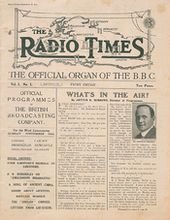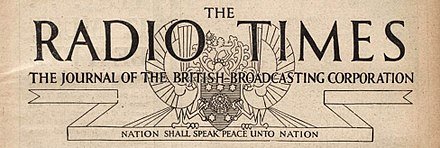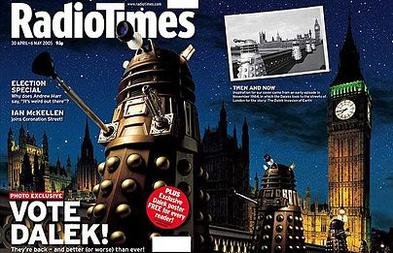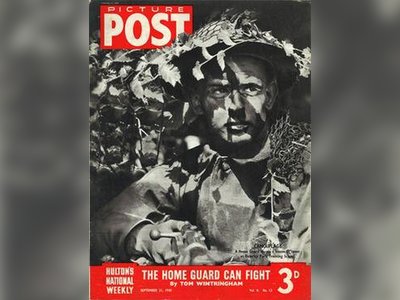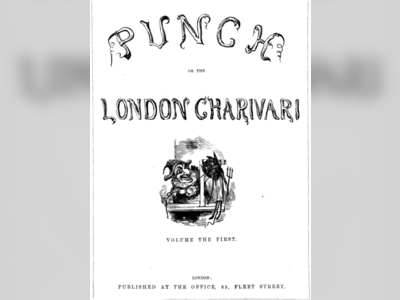British Heritage
Remember, Cherish, Learn.
beta
Radio Times
Contribution of Radio Times to British Heritage.
Radio Times, the renowned British weekly listings magazine, has made significant contributions to British heritage since its inception in May 1923. Founded by John Reith, the general manager of the British Broadcasting Company (BBC), Radio Times holds the distinction of being the world's first broadcast listings magazine. Throughout its long and storied history, it has been a crucial part of British culture, providing comprehensive information about television and radio programme schedules.
The magazine played a vital role in promoting the BBC's broadcasting services and encouraging listeners to tune in to the rapidly growing medium of radio. In its early years, Radio Times helped increase the popularity of radio in the UK by providing detailed and accessible listings for BBC wireless stations. Its first issue, published on 28 September 1923, carried programme details for six BBC stations: 2LO, 5IT, 2ZY, 5NO, 5WA, and 5SC. At the time, newspapers were wary of radio listings, fearing that it might reduce their sales, but Radio Times filled this void and became the go-to source for radio programme information.
In 1936, when the BBC launched the world's first regular high-definition television service with 405-line resolution, Radio Times adapted its listings to include television programmes. As a result, it became the first-ever television listings magazine globally, cementing its place in broadcasting history. The magazine played a pivotal role in introducing television to the British public and continued to showcase its listings for both radio and television, helping millions of households plan their viewing and listening preferences.
Over the years, Radio Times evolved and adapted to changes in technology and broadcasting trends. It weathered the challenges of World War II, providing reduced radio schedules during the conflict, and continued to inform and entertain its readers. In 1969, Radio Times underwent a radical makeover, switching from a month-day-year date format to a day-month-year format, and it ceased carrying cigarette advertisements after 46 years, reflecting the changing times and social attitudes.
In the following decades, Radio Times continued to expand its content, incorporating color pages, feature sections, and innovative design elements. It showcased the growing diversity of media with the inclusion of satellite and cable channels, reflecting the ever-changing landscape of television and broadcasting. The magazine's commitment to providing comprehensive and up-to-date listings has made it a valuable resource for generations of British audiences, helping them navigate the vast array of programming options available.
Through its extensive coverage of major cultural events such as the Olympics and Commonwealth Games, Radio Times has become an integral part of British heritage, chronicling and celebrating significant moments in the nation's history. Its bumper issue for the London 2012 Olympics, with 16-day listings of BBC's coverage, stands as a testament to its dedication to offering comprehensive guides for major events.
Radio Times has left an indelible mark on British heritage, not only through its role as a pioneering broadcaster listings magazine but also through its influence on British media and culture. For nearly a century, Radio Times has been a trusted companion for millions of British households, guiding them through the ever-expanding world of television and radio programming.
One of the key contributions of Radio Times to British heritage is its support and promotion of the BBC's broadcasting services. As an in-house publication of the BBC, it has played a significant role in building the BBC's reputation as a leading broadcaster, connecting the corporation with its audience and encouraging engagement with its programming.
The magazine's commitment to providing high-quality content has earned it a reputation for using leading writers and illustrators. Its iconic covers, particularly those from special editions, are now considered collectible design classics, showcasing the evolution of artistic styles and tastes over the decades.
Radio Times' role as a comprehensive listings guide has been instrumental in shaping British viewing habits. It has helped families plan their evenings, providing a shared experience of tuning in to beloved programmes. By highlighting the latest entertainment, including films, interviews, and lifestyle items, the magazine has fostered a sense of shared cultural experiences and conversations across the nation.
Furthermore, Radio Times has played an important part in introducing and popularizing new technologies. As television and radio broadcasting evolved, the magazine adapted its listings to accommodate the arrival of color television, satellite channels, and cable networks. Its coverage of technological advancements has helped British audiences embrace these changes and stay informed about the latest developments in broadcasting.
The magazine's engagement with major cultural events, such as the Olympics and Commonwealth Games, has further solidified its place in British heritage. Through detailed listings and special features, Radio Times has captured the spirit of these events, celebrating the achievements of British athletes and fostering a sense of national pride.
Over the years, Radio Times has weathered challenges, including competition from other listings magazines and changes in media consumption habits. Yet, it has continued to evolve and innovate, remaining a relevant and cherished publication in British households.
Radio Times' success and enduring legacy are a testament to its role as an essential cultural institution in the UK. Over the decades, it has achieved remarkable milestones, becoming the magazine with the largest circulation in Europe during the 1950s, with an average sale of 8.8 million in 1955. Even in the face of competition and changing media landscapes, it remained one of the most widely read publications in the country.
The magazine's influence on British culture cannot be overstated. It has been a trusted source of information, helping millions of households plan their entertainment and leisure time. As a companion to the BBC's broadcasting services, Radio Times has been instrumental in promoting the corporation's programmes and fostering a sense of national identity around shared cultural events.
The iconic covers and design elements featured in Radio Times have become treasured pieces of design history, reflecting the changing aesthetics and artistic trends of each era. The magazine's commitment to using leading writers and illustrators has left a lasting impact on the field of journalism and design.
Radio Times' adaptability and willingness to embrace new technologies have allowed it to remain relevant throughout its existence. From the early days of radio to the digital age, the magazine has continued to evolve and serve as a bridge between audiences and the ever-expanding world of media and entertainment.
While the magazine's circulation has fluctuated over the years, it continues to be a beloved and indispensable part of British culture. Radio Times' ability to connect with audiences and reflect the nation's viewing habits has solidified its place in British heritage, making it a cherished institution for generations of readers.
In conclusion, Radio Times' pioneering role as the world's first broadcast listings magazine, its contribution to British heritage through promoting the BBC's broadcasting services, and its enduring legacy as a trusted companion for millions of households have firmly established it as a significant and iconic publication in British culture. Throughout its rich history, Radio Times has continuously evolved to meet the changing needs of audiences, and its influence on media, design, and cultural conversations makes it an enduring symbol of British heritage.
The magazine played a vital role in promoting the BBC's broadcasting services and encouraging listeners to tune in to the rapidly growing medium of radio. In its early years, Radio Times helped increase the popularity of radio in the UK by providing detailed and accessible listings for BBC wireless stations. Its first issue, published on 28 September 1923, carried programme details for six BBC stations: 2LO, 5IT, 2ZY, 5NO, 5WA, and 5SC. At the time, newspapers were wary of radio listings, fearing that it might reduce their sales, but Radio Times filled this void and became the go-to source for radio programme information.
In 1936, when the BBC launched the world's first regular high-definition television service with 405-line resolution, Radio Times adapted its listings to include television programmes. As a result, it became the first-ever television listings magazine globally, cementing its place in broadcasting history. The magazine played a pivotal role in introducing television to the British public and continued to showcase its listings for both radio and television, helping millions of households plan their viewing and listening preferences.
Over the years, Radio Times evolved and adapted to changes in technology and broadcasting trends. It weathered the challenges of World War II, providing reduced radio schedules during the conflict, and continued to inform and entertain its readers. In 1969, Radio Times underwent a radical makeover, switching from a month-day-year date format to a day-month-year format, and it ceased carrying cigarette advertisements after 46 years, reflecting the changing times and social attitudes.
In the following decades, Radio Times continued to expand its content, incorporating color pages, feature sections, and innovative design elements. It showcased the growing diversity of media with the inclusion of satellite and cable channels, reflecting the ever-changing landscape of television and broadcasting. The magazine's commitment to providing comprehensive and up-to-date listings has made it a valuable resource for generations of British audiences, helping them navigate the vast array of programming options available.
Through its extensive coverage of major cultural events such as the Olympics and Commonwealth Games, Radio Times has become an integral part of British heritage, chronicling and celebrating significant moments in the nation's history. Its bumper issue for the London 2012 Olympics, with 16-day listings of BBC's coverage, stands as a testament to its dedication to offering comprehensive guides for major events.
Contribution to British Heritage
Radio Times has left an indelible mark on British heritage, not only through its role as a pioneering broadcaster listings magazine but also through its influence on British media and culture. For nearly a century, Radio Times has been a trusted companion for millions of British households, guiding them through the ever-expanding world of television and radio programming.
One of the key contributions of Radio Times to British heritage is its support and promotion of the BBC's broadcasting services. As an in-house publication of the BBC, it has played a significant role in building the BBC's reputation as a leading broadcaster, connecting the corporation with its audience and encouraging engagement with its programming.
The magazine's commitment to providing high-quality content has earned it a reputation for using leading writers and illustrators. Its iconic covers, particularly those from special editions, are now considered collectible design classics, showcasing the evolution of artistic styles and tastes over the decades.
Radio Times' role as a comprehensive listings guide has been instrumental in shaping British viewing habits. It has helped families plan their evenings, providing a shared experience of tuning in to beloved programmes. By highlighting the latest entertainment, including films, interviews, and lifestyle items, the magazine has fostered a sense of shared cultural experiences and conversations across the nation.
Furthermore, Radio Times has played an important part in introducing and popularizing new technologies. As television and radio broadcasting evolved, the magazine adapted its listings to accommodate the arrival of color television, satellite channels, and cable networks. Its coverage of technological advancements has helped British audiences embrace these changes and stay informed about the latest developments in broadcasting.
The magazine's engagement with major cultural events, such as the Olympics and Commonwealth Games, has further solidified its place in British heritage. Through detailed listings and special features, Radio Times has captured the spirit of these events, celebrating the achievements of British athletes and fostering a sense of national pride.
Over the years, Radio Times has weathered challenges, including competition from other listings magazines and changes in media consumption habits. Yet, it has continued to evolve and innovate, remaining a relevant and cherished publication in British households.
Success and Legacy
Radio Times' success and enduring legacy are a testament to its role as an essential cultural institution in the UK. Over the decades, it has achieved remarkable milestones, becoming the magazine with the largest circulation in Europe during the 1950s, with an average sale of 8.8 million in 1955. Even in the face of competition and changing media landscapes, it remained one of the most widely read publications in the country.
The magazine's influence on British culture cannot be overstated. It has been a trusted source of information, helping millions of households plan their entertainment and leisure time. As a companion to the BBC's broadcasting services, Radio Times has been instrumental in promoting the corporation's programmes and fostering a sense of national identity around shared cultural events.
The iconic covers and design elements featured in Radio Times have become treasured pieces of design history, reflecting the changing aesthetics and artistic trends of each era. The magazine's commitment to using leading writers and illustrators has left a lasting impact on the field of journalism and design.
Radio Times' adaptability and willingness to embrace new technologies have allowed it to remain relevant throughout its existence. From the early days of radio to the digital age, the magazine has continued to evolve and serve as a bridge between audiences and the ever-expanding world of media and entertainment.
While the magazine's circulation has fluctuated over the years, it continues to be a beloved and indispensable part of British culture. Radio Times' ability to connect with audiences and reflect the nation's viewing habits has solidified its place in British heritage, making it a cherished institution for generations of readers.
In conclusion, Radio Times' pioneering role as the world's first broadcast listings magazine, its contribution to British heritage through promoting the BBC's broadcasting services, and its enduring legacy as a trusted companion for millions of households have firmly established it as a significant and iconic publication in British culture. Throughout its rich history, Radio Times has continuously evolved to meet the changing needs of audiences, and its influence on media, design, and cultural conversations makes it an enduring symbol of British heritage.
- Radio Timesen.wikipedia.org

